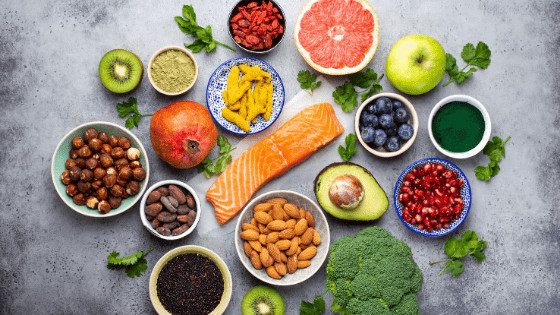
20 Feb 6 Superfoods for Heart Health
Preventing heart disease and investing in heart health is possible at any age. It’s mainly our lifestyles that warrant a little fine tuning. Learning the tools and strategies to make your choices count are key… and our food choices are no exception.
Food and nutrition impact our entire body — including our hearts. With the help of other healthy lifestyle choices (adequate sleep, physical activity, and low stress environments), these six superfoods can grasp control of your heart health. I like to think of these superfoods as little brooms that sweeps the junk out of your arteries, allowing blood to flow adequately throughout the body.
The future of cardiovascular disease prevention and treatment will not be found in your medicine cabinet, rather in your kitchen cupboard or in your back yard growing on a tree.
Sayer Ji, Green Med Info
1. Pomegranate for heart health
Isn’t the pomegranate fruit just the coolest? From the outside, it looks pretty tough, firm, and hard to get into. But once you cut that bright red skin open, a whole new world lies inside. Pomegranates are made up of hundreds of sweet seeds, called arils. These seeds are the edible part of the fruit that can be eaten raw or made into juice.
Both the juice and seeds are key sources of flavonoids, anthocyanins, and punicic acid, which are the phytochemicals responsible for it’s antioxidant and anti-inflammatory properties. A study conducted on patients with carotid artery stenosis showed that regular pomegranate consumption can improve and/or prevent the progression of atherosclerosis (plaque build up in the arteries) because of it’s ability to lower blood pressure and reduce lipid accumulation in the heart muscle.
2. Seeds: Chia + Flax
Seeds may be tiny, but they sure do pack a punch. Chia seeds and flaxseeds are two of my favorite seeds because not only are they both rich in vitamins, minerals, and fiber, BUT they are also a great source of the plant-based essential omega-3 fatty acid, ALA (alpha-linolenic acid). Omega-3’s are essential in our diets, meaning the body cannot produce them.
A study shows that circulating ALA’s in the blood help to reduce high blood pressure (hypertension), which is often associated with peripheral artery disease. Another study showed that ALA’s help to lower LDL. Excess and wrong types of LDL in the blood can lead to plaque build-up in the arteries, which can lead to strokes and heart attacks.
Chia can be eaten whole, but flaxseeds need to be ground up to be able to absorb their nutrition! They are fairly bland in flavor, gluten free, and can be incorporated into our foods in many ways. I love to add them into muffins, pancakes, and smoothies or sprinkled on top of salads, yogurt, and oatmeal.
3. Fish
Fish and fish oil are potent sources of the animal based omega-3 fatty acids , DHA (docosahexaenoic acid) & EPA (eicosapentaenoic acid). Abundant evidence shows that the DHA and EPA found in fish benefit SO many risk factors that could lead to heart issues including blood pressure, blood vessel function, heart function and lipid (fat) blood levels. Fish provide anti-thrombotic, anti-inflammatory, anti-oxidative, and anti-arrhythmic actions, which protect us from sudden and long-term heart issues.
The American Heart Association recommends we eat at least two servings of fish per week, and I second this recommendation! All fish contain DHA and EPA, but the levels can vary depending on the type of fish and the fish’s habitat (wild-caught vs farm raised). Ideal sources are cold-water, wild caught, fatty fish such as tuna, salmon, mackerel, herring, cod liver oil, sardines, trout, anchovies, and halibut. Commercially prepared fried fish should be avoided because they are typically low in omega-3 and high in trans-fatty acids.
4. Garlic
Garlic is a vegetable that we mainly use solely for the purpose of flavor. We often overlook the powerful benefits that garlic has on the body, particularly the heart. The active component in garlic, called allicin, is activated when garlic is chopped or crushed.
Garlic offers protective benefits for heart disease in it’s ability to limit the formation of platelets in the blood, which helps to lower blood pressure, reduce the amount of LDL in the arteries, limit LDL oxidation, and prevent arrhythmia (irregular heart beats). Incorporating garlic into the diet can slow the progression of atherosclerosis and lower your risk of heart attacks and stroke.
5. Avocado
Avocados are the fruit that keeps on giving. They are naturally low in sugar, high in fiber, and filled with a vast array of nutrients such as vitamin E, vitamin C, vitamin K, B vitamins, magnesium, potassium, and copper. What’s even better is the avocado is one of the few fruits that also serve as a healthy fat. It is an excellent source of monounsaturated fatty acids, which help to boost HDL and lower LDL.
We can eat it raw or in its oil form. Mashed avocados are great in salads, smoothies, dips, and baked goods, and can serve as the perfect substitute for spreads like mayonnaise, margarine, or butter.
6. Dark Chocolate
Aren’t we all looking for any excuse to reach for a piece of chocolate? Well, I am here to tell you that chocolate makes both our taste buds and our hearts pretty dang happy…dark chocolate that is. Dark chocolate offers heart benefits because it is rich in the antioxidants, known as flavonoids. Flavonoids help to reduce blood pressure and LDL, as well as improve blood flow, arterial elasticity, and blood vessel dilation. This can reduce your risk and prevent the progression of heart diseases.
Milk chocolate tastes good, but it will not give you the benefits that dark chocolate does. Look for dark chocolate that is at least 70% cocoa or greater. The higher the cocoa content, the better the chocolate is for your heart health.


